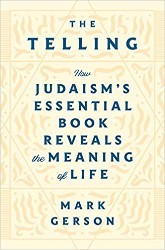Most books on Passover fall into one of two categories: they are either theoretical examinations of the themes and ideas of the holiday, or they are practical guides to spicing up one’s seder. It is a rare book that can be both, but Mark Gerson’s The Telling: How Judaism’s Essential Book Can Change Your Life is able to walk that line. Through a series of well-written, sermonic vignettes, Gerson delves into the major themes and messages within the haggadah, while simultaneously producing an invaluable resource for all those who crave new material for their family celebrations.
The Telling begins with a few chapters on the history and practices of Passover, but the bulk of the book follows a familiar format to all those who are studied in the hermeneutics of the holiday; it quotes a short passage from the haggadah and then expands on its themes. In this way, the book’s format mimics the haggadah’s own approach, wherein the rabbis chose to tell the story of Passover through quoting biblical passages and then adding their own commentary. Each chapter is quite diverse and gives a platform for Gerson to examine many of the most foundational ideas in Judaism, such as: gratitude, the messiah, our obligation to the stranger, and parenthood. For this reason, the book doubles in a way as a thematic introduction to the major concepts and philosophies of Judaism. In writing this book, Gerson makes a similar claim about the haggadah that others have made about the Torah, “turn it, turn, for all is in it.” (Avot 5:21)
Though the book is certainly learned — taking its Jewish sources from every era, be it biblical, rabbinic, medieval, hassidic, or modern — it is not written for insiders. Gerson does a thorough job of defining terms and carefully introducing stories so as not to overwhelm the reader. Additionally, one walks away from reading the book with more than just an appreciation of Jewish wisdom. Gerson is able to link major themes in Judaism to recent insights in business, psychology, philosophy, and history. The book also references many well known movies and books to further connect to its reader and make its varied points. Because the book packs so much into every page, one leaves the experience of reading it with a desire to one day return. The book is a quick, but compelling read, with the option to go slow and take in all the information Gerson doles out.
In the end, the book comes to an abrupt stop. Much of the reason for this is because after giving critical background information about Passover, it focuses entirely on the longest section of the seder — the maggid section, where the actual story is told. When the plagues end and the Jews march toward freedom, Gerson’s job is done. However, we know that there is much more to the seder than this. We haven’t even had dinner yet. Thus, the book calls out for a sequel. Gerson is a talented storyteller and teacher and it’s clear there is much to learn from him.
Rabbi Marc Katz is the Rabbi at Temple Ner Tamid in Bloomfield, NJ. He is author of the books Yochanan’s Gamble: Judaism’s Pragmatic Approach to Life (JPS) chosen as a finalist for the PROSE award and The Heart of Loneliness: How Jewish Wisdom Can Help You Cope and Find Comfort (Turner Publishing) which was chosen as a finalist for the National Jewish Book Award.


